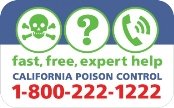Officials with the California Poison Control System (CPCS) are reminding everyone that ingesting lead, a toxic metal, is easier than most people think. A naturally occurring metal, lead can be found everywhere, making it easy for people and animals to get poisoned by it. That is why CPCS urges everyone to help observe National Lead Poisoning Prevention Week (NLPPW), observed Oct. 20 through 26.
Because there are no known safe levels of lead, even a small amount of lead exposure is harmful. The CDC estimates that approximately 500,000 children in the United States have unsafe blood levels of lead.
Lead exposure can occur by breathing in lead dust or ingesting contaminated food or water.
“Both adults and children are at risk of lead poisoning, but children are the most susceptible,” said Dr. Rais Vohra, Medical Director for the Fresno/Madera Division of CPCS. “Lead poisoning can cause a variety of medical problems, including damage to the brain and nervous system. Exposure to lead can also cause behavioral issues and slow growth and development. Some of the health problems caused by lead can cause long-term or permanent complications. Fortunately, early detection and intervention can lead to good outcomes when we parents and caregivers work with children’s pediatricians and doctors on the issue of childhood lead poisoning.”
Although lead is toxic to human and animal health, it has been used in many products that people come into daily contact with, including imported spices and pottery, as well as paint and glass used in older homes, old batteries or automotive parts, and even water from old pipes. As the dangers presented by lead exposure have been recognized, efforts to phase it out have been undertaken. For example, lead in gasoline is no longer a danger to public health due to successful efforts to eliminate this source of lead poisoning. To continue to help combat the dangers of environmental lead exposure, federal officials have recently mandated the removal of all lead pipes within the next decade.
Tips to Prevent Lead Poisoning
Supervise children. Children often accidentally ingest lead dust because they touch, breathe or swallow sources that may contain lead. For example, putting dirt or toys – imported ones often can contain lead – in their mouth.
Clean toys with soap and water before giving them to children.
Make sure you teach your children to wash their hands often with soap and water. You should make a practice of doing it, too.
Get rid of all recalled toys. Stay up-to-date on current recalls by checking the Consumer Product Safety Commission website.
Be mindful of imported spices, candy or pottery, all of which have been linked to high lead levels. If you have questions, call the CPCS 24-hour hotline at 1-800-222-1222.
About CPCS
Call Poison Control at 1-800-222-1222 (number is the same in all states) for questions about poison encounters. Trained pharmacists, nurses and other providers are available to help 24 hours a day, seven days a week. The service is free, confidential and interpreters are available. Get weekly tips about safety by texting TIPS to 20121 for English or texting PUNTOS to 20121 for Spanish. Follow CPCS on Facebook and on Twitter @poisoninfo. CPCS is part of the University of California San Francisco School of Pharmacy and is responsible to the California Emergency Medical Services Authority.





